|
 
 
Tractate 3 : The Error of Boethius (continued)
The graphic of Boethius’ metaphysical system, when viewed from the point of perception regarding higher levels of value, higher levels of dominance of one over the other, becomes:
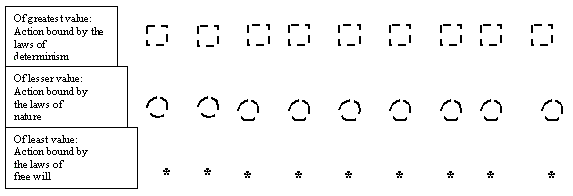
This form of categorizing action provides the logic of accepting, as well as provides the means of understanding how it is determinism could exist ‘within’ a region of free will. This form of categorizing action provides an understanding as to how it is possible for one form of action, free will, to fall ‘under’ the influence of determinism through the action of determinism superceding free will. An example of just such a situation would be one forcefully holding the hand of another on a hot stove. This action supercedes the desired action of the victim and thus the concept of ‘victim itself emerges.
Within Boethius’ metaphysical system, what happens to the concept of 1st truth? First truth precedes the ‘levels’ generated by such a system:
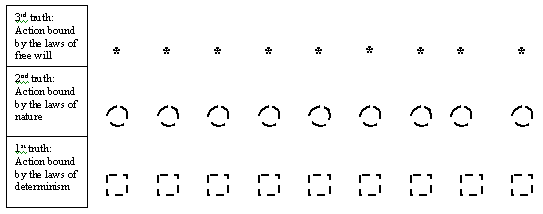
But, one may say: How could it be that first truth does not correlate to anything other than what Boethius suggests? Boethius used the metaphysical system Aristotle suggested: The physical is real and the physical is ‘the’ system. Isn’t that in fact why 1st truth is called 1st truth? Doesn’t the concept of there being ‘a’ single location of existence itself suggest there is ‘a’ singular 1st truth to which this system can be reduced?
As we shall see in the next few sections, the answer to both questions is ‘Yes’ if we apply Boethius’ ‘layers’ of truth to the Aristotelian metaphysical system of ‘a’ location of existence being the universe itself, being physical existence itself.
As we shall see in Part II, the answer to both questions is ‘No’ if we apply an independent location for each form of action for there are not three ‘locations’ of existence equating to three forms of action but rather there are four locations independent of each other equating to four forms of action.
Boethius’ metaphysical system and social acceptance:
Boethius’ metaphysical system appears to provide the understanding necessary regarding the paradox of omniscience and free will existing simultaneously. Boethius’ system provides the rational explanation regarding the contradictory simultaneous existence of an ‘all knowing’ whole and men having ‘control’ of their lives. Boethius appears to provide an understanding regarding why men are responsible for their actions in the presence of divine foreknowledge.
However, does Boethius’ metaphysical system really provide answers regarding the contradictory simultaneous existence of free will and divine foreknowledge – predestined results, or is Boethius’ metaphysical system simply a system which attempts to do so while falling short of the mark?
Is there any other choice? Is there any other metaphysical system, which solves the paradox? Is there any metaphysical system which would remain standing once we applied Ockham’s Razor to an alternative solution regarding ‘free will’ and divine foreknowledge, omniscience’, existing simultaneously?
Presently there is no other alternative metaphysical system other than Aristotle’s metaphysical system of there being only one location of existence. As such, even today, we still perceive Boethius’ solution to be ‘the’ solution to the paradox of free will and divine foreknowledge existing simultaneously. Thus:
‘There can be little question that Boethius, more than any other philosophic author, helped the great Schoolmen to retain a general comprehensive view of the world as a whole, in spite of the distractions of their minute inquiries. ’ (Boethius, The Consolation of Philosophy, Penguin Books, 1969, England, Victor Watts, Merton College, Oxford.)
remains the order of the day.
And so it is we continue to accept Boethius’ solution:
‘In the same way, human reason refuses to believe that divine intelligence can see the future in any other way except that in which human reason has knowledge.’…
Boethius’ metaphysical system and perpetual historical acceptance:
Historically we had little choice but to accept Boethius’ metaphysical system for we had no ‘place’ else to place either ‘free will’ or ‘determinism’ or ‘free will and determinism’ for that matter.
Until we understand the concept of multiple locations of existence, we ‘will’ continued to accept Boethius’ solution:
‘In the same way, human reason refuses to believe that divine intelligence can see the future in any other way except that in which human reason has knowledge.’…
Boethius’ metaphysical system and why it is we have not presently discarded:
We presently have no choice but to accept Boethius’ metaphysical argument regarding the contradictory simultaneous existence of free will and determinism existing ‘within’ the confines of a physical universe for the very confines of the physical is ‘the’ location Aristotle recognized as being ‘existence’, ‘the’ existence.
We remain ‘boxed in’. We insist upon following the primary principle of science that if one cannot measure it, it has no validity in terms of ‘existing’. (Question: I understand what you mean by this. However, an ambiguity still remains. In quantum theory, many "theoretical" particles are "expected" to exist, even though they have yet to be measured. Answer: True, however, science has the perception that if it exists, it is measurable. It may not be measurable today, it will be measurable sometime in the future. Science attempts to validate ‘theoretical’ particles existing by finding a means of proving their existence through measurement.) As such, we relegate faith and reason, two means we have of developing truth, understanding truth, to the level of being second-rate perceptual tools. Because we perceive faith and reason to be second-class perceptual tools, we submit to the perception of observation/science being ‘the’ only ‘true’ perceptual tool we have in our arsenal of perceptual weapons. We ‘believe’, have faith in, and we think it is ‘rational’, reasonable, that our understanding of the whole and of our, individualities’ relationship to the whole is comprehensible only through what it is we ‘see’, what it is we can measure.
Where does this leave us in terms of our present perceptions regarding the contradictory simultaneous existence of the individual’s free will and the whole’s divine foreknowledge? It leaves us in the same state of confusion regarding the interrelationship of determinism and free will as we experienced over fifteen hundred years ago:
‘In the same way, human reason refuses to believe that divine intelligence can see the future in any other way except that in which human reason has knowledge.’…
In short, we remain frustrated. We continue to fall back upon the argument: ‘Get used to it, because that’s just the way it is.’
Part II: Resolving the issue with a new metaphysical perception:
The wall of perception:
‘It is not allowed to man to comprehend in thought all the ways of the divine work.’ (Boethius: The Consolation of Philosophy, IV, 6)
So it is our debates, regarding religion, begins. So it is our predisposition regarding ontological rationality emerges. All our debates regarding ontological, cosmological, and metaphysical discussions begin with a conscious or subconscious foundation that: ‘It is not allowed to man to comprehend in thought all the ways of the divine work.’
This is no way to begin a discussion regarding the concept of 1st truth. This is no way to begin a discussion of 1st principle. Who would dispute the concept that we ‘cannot ‘know’ truth to be ‘truth’. However, just as surely as no one would deny we may not be able to ‘know’ truth to be truth, no one would profess we are incapable of defining 1st truth, 1st principle, as best we can. Having defined 1st truth, we are then capable of proceeding with the dialectic regarding the defined truth and the impact such a defined truth has upon ourselves, our universe, and the whole.
Without the acknowledgement of our being able to define ‘truth’ as best we can and moving on from that point, all science collapses. Without the acknowledgement of our being able to define ‘truth’ as best we can and moving on from there, all faiths evaporate. Without the acknowledgement of our being able to define ‘truth’ as best we can and moving on with life itself, all reason becomes sheer irrationality itself.
Time after time our religious, scientific, and philosophical opinions fall back upon the ultimate point of view we throw in the path of arguments persistently eroding away at our bastions of reason, faith, and observation: ‘It is not allowed to man to comprehend in thought all the ways of the divine work.’
If we have in fact reached the limits of metaphysical philosophical arguments, it is not because there is no infinitely expansive realm of metaphysics left to be explored. If a metaphysical limit has been reached it is because we have defined the further limits of metaphysics to be nonexistent through the proclamation that: ‘It is not allowed to man to comprehend in thought all the ways of the divine work.’
Boethius’ words: ‘It is not allowed to man to comprehend in thought all the ways of the divine work.’ Are repeated over and over because they themselves are the words describing the barrier which keeps us separated from the great expanse of creativity regarding our further understanding the interactions and interrelationships between ‘being’/individuality, being/action, process – reality, and ‘Being’/the whole.
As such, within this tractate, within this work, we are going to reject the concept of: ‘It is not allowed to man to comprehend in thought all the ways of the divine work.’ while at the same time accepting its basic premise. This may sound contradictory but it is not. In essence, what we are going to do is accept that while the statement, ‘…man may not be able to comprehend in thought ‘all’ the ways of divine work.’, we are going to presume that any questions man is capable of initiating, man is capable of resolving. The only limits man is incapable of understanding are limits man is incapable of defining.
This is an exciting principle. It is the very principle that establishes as well as accepts humanity’s purpose in terms of leaning and humanity’s purpose in terms of gaining knowledge will never come to an end as long as ‘the’ universe exists. Such a principle establishes: If one loves the pursuit of knowledge, as it appears our specie does, then one need never agonize as regards potentially approaching the end of the learning process.
With this in mind, we have little choice but to accept the concept that free will may in fact exist independent of determinism and vice versa, determinism may in fact exist independent of free will. In fact, we may have little choice but to accept the fact that both statements exist as ‘truths’ simultaneously.
How can we make such a statement when it appears we have apparently rejected just such a statement through our initial rejection of Boethius’ metaphysical perception regarding the simultaneous existence of free will and divine foreknowledge?
The very perception of the simultaneous existence of:
- Free will existing independent of determinism
while
- Determinism exists independent of free will
is where the essence of this tractate lies. How can this be the essence of this tractate if the point of this tractate is to dismantle the issue of determinism and free will existing simultaneously as Boethius professes them to be? It is not the concept regarding the very existence of free will, divine foreknowledge, and the universe, which are being questioned. Rather what is being questioned, is the limited confinement itself, the limits we place upon such concepts that are being challenged within this tractate.
Boethius asserted that we can create a solution regarding the two concepts: free will and determinism, through the process of mixing the two. Try as we might over the last 1500 years, we have been unable to create a ‘solution’ regarding the two. We have only been able to create a mixture of the two.
A true solution of free will and determinism would create a system where each is independent of the other yet a system where each is dependent upon what the other has to offer. More contradictions? The statement is only a contradiction if one retains our present philosophical orientation of being ‘enclosed’ within ‘a’ system rather than being ‘enclosed’ within a system, which finds itself in turn enclosed within a system.
We have a perception regarding a metaphysical system in place. One aspect of the perception we have in place was alluded to via Zeno. Aristotle identified a second aspect of the perception. Boethius then began the process of introducing a contradictory perception, which confused the issue regarding the simultaneous existence of free will and determinism. Boethius embraces Zeno’s self-stated assertions of uncertainty as well as Aristotle’s arguments regarding the universe being the only ‘location’ of the action.
In order to embrace both Zeno and Aristotle, Boethius strongly suggests that free will and ‘divine foreknowledge’ are compatible in the form of adjacent actions of multiplicity found ‘within’ a region of multiplicity itself.
The complexity of such a statement requires the application of Ockham’s razor in order to reduce the statement to a more intelligible form. If the statement is unintelligible as it is, why make the statement in the first place? The statement is made because it accurately represents where we as philosophers presently find ourselves. Boethius led us into such depths of confusion. Boethius led us into the blind alley. However, can we really lay the blame upon Boethius for our being mired in the perpetual cyclical argument:.
We cannot, in good conscious, ‘blame’ Boethius for our previous inability to break out of the catch 22 within which we find our present metaphysical thought
We, you and I and you and I together, willingly, through the process of free will, accept Boethius’ presumptions. We embrace such a perception under the assumption that we are limited creatures not just in terms time but also in terms of timelessness itself. We embrace such a perception in the name of being humble before the majestic awesome presence of an ‘all knowing’ entity.
False modesty leads to the entrapment of the mind within the confines of prison walls impossible to break through. The only way we have of breaking through our self-created wall of confinement is to break down the wall of humility we have built around ourselves. Boethius may have built the wall of limits within which we find ourselves entrapped, but we are the ones who have passively accepted their perceived impenetrability.
To free ourselves of these prison walls, we must rely upon ourselves. The method of breaking through this wall of perception is to replace the perception itself with a new perception.
Having said this, let’s begin an examination of ‘the wall’
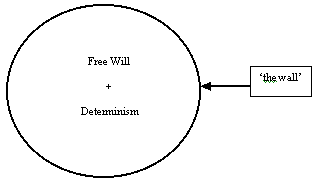
We perceive free will and determinism to coexist not as a mixture but as a solution in and of itself. Try as we might, oil and water do not naturally create a solution. They are incompatible and that is just the point. Free will and determinism do not create a solution and as such, we cannot comprehend an alternative potential solution unless we are willing to remove the walls of Aristotle and begin looking for a different perception regarding how to incorporate the two, free will and determinism, into a different metaphysical model than the one Boethius suggested.
Boethius asserted the two, determinism – ‘divine foreknowledge’ as he puts it, and free will exist side by side, exist as companions forever tied to the very substantive travels of all individuals be they human or other forms of existence which have the distinctive mark of free will stamped upon their brows.
The only means we have of throwing off the yoke of determinism is through a new means of perception regarding just where it is we perceive ourselves to be. Such a perception would have the effect of allowing ourselves to redefine what it is we understand ourselves to be. Such a redefinition would have the impact of allowing us to establish an understanding of just why it is we may exist as individuals and why it is we may exist as the sole remaining member of the specie, Homo sapiens.
It is possible to model an understanding demonstrating how pure free will can exist uncompromised by ‘divine foreknowledge’. In the process of building such an understanding, we will establish a model where free will and determinism may not only be independent of each other but may simultaneously be interdependent of each other’s existence. The final result: We will see how it is metaphysics is alive rather than being ‘dead’ as we presently ‘believe’.
Even more excitingly, we will begin to gain an insight as to how it is metaphysics retains an ever-moving horizon, which may well extend infinitely beyond our reach just as finality to the extent of knowledge itself may extend infinitely beyond our reach.
This tractate, however, is not the tractate within which this last statement will be specifically examined. The detailed examination of such a statement will have to wait for tractate 18: The End of the Beginning. For the time being, we must stay on track and return to our understanding regarding a new solution to the long-standing paradox regarding the simultaneous presence of free will and divine foreknowledge.
Rationalizing the irrational
‘I must be right because you don’t ‘know’ that what you are telling me is an absolute.’
What is this argument that because we have perceptual limitations, there are things we cannot ‘know’ and therefore it must be accurate to assume ‘divine foreknowledge’ exists yet ‘divine foreknowledge’ is not determinism.
Is a metaphysical system, which embraces the simultaneous existence of free will and determinism co-existing in the form of adjacent actions of multiplicity, found ‘within’ a region of multiplicity itself, a logical point of metaphysical perception? In terms of a metaphysical system of the past, yes it is. In terms of the new knowledge we have gleaned over the last millennium and a half, no it isn’t.
It is time to update our perception of rational metaphysical perceptions. In order to do so, lets examine a new metaphysical system to understand just how free will and determinism may coexist without contradicting one another as is the case with Boethius’ metaphysical system.
The limits of language:
We live ‘within’ the limits of what it is we are able to communicate to each other. We live ‘within’ this thing we call language. The implication is we will never ‘know’ truth.
Regardless of whether or not one agrees with such a statement, one cannot ignore the fact that we are confined by language. Likewise it must be remembered that we are immersed ‘within language and thus must either find a means to break out of the limits language places upon us or we must expand language to meet our expanded perceptions.
We presently embrace concepts such as:
Free will has been predetermined yet predestined acts remain acts of free will.
Predestined free will is free will.
Free will immersed within divine foreknowledge is free will
We accept such contradictions because we ‘believe’
‘In the same way, human reason refuses to believe that divine intelligence can see the future in any other way except that in which human reason has knowledge.’…
We hide behind the perception that is is ‘too difficult’ a paradox to understand the whole and as such we submit to arguments that we should not ‘waste’ our energies upon such impossible tasks as understanding the relationship between free will and determinism.
Until we refuse to end our actions of hiding behind the conceptual perception that it is too complicated to revise language so as to elevate language to the level capable of describing advanced metaphysical perceptions, we will never understand how it is:
Free will that has been predetermined is not free will.
Predestined free will is not free will.
Free will immersed within ‘divine’ foreknowledge might very well be free will
It is understandable why we hesitate to release the concept of determinism and begin to embrace the full ramifications of free will. Free will places a yoke of responsibility upon each and every one of us. Determinism, on the other hand:
- Provides the rational for our not being responsible for our actions
- Accepts our actions as a matter of fact, actions which we cannot avoid
- Excuses our need to take responsibility for our action
Who would be so irrational as to accept one’s responsibility for one’s own action when there is a way to avoid such responsibility? That may be a fair statement, but to ignore ‘what is’ in favor of ‘what is not’ does not nullify ‘what is’ being ‘what is’.
Should we be afraid of exploring a rational understanding of the whole and our relationship to the whole? Perhaps, on the other hand, perhaps Churchill provided some insightful perspective we can apply to such a situation when he said: ‘We have nothing to fear but fear itself.’
Oil and Water
Free will and determinism are like oil and water – you cannot put them together and obtain a solution. You may put them together but what you obtain is simply a mixture.
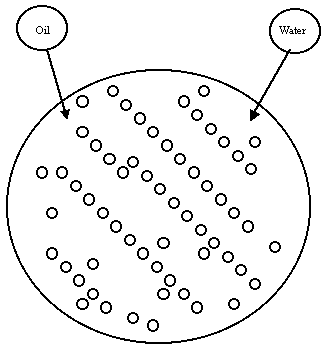
So, which is the water and which is the oil? Is free will oil or water? Is determinism oil or water? If one is oil is the other water?
When one performs the operation of mixing oil and water one obtains oil being contained within water unless one factors in the container itself. If one factors in the container itself, one may obtain a layer of oil coating the inside of the container within which water is found to contain the droplets of oil. This is not to be ignored for the analogy itself exists. For the time being however, we have little choice but to ignore this aspect of the analogy and move on with our discussion. The more complex analogy will be addressed later.
As such, lets examine the two possibilities:
Possibility 1:
Oil/free will
Water/determinism
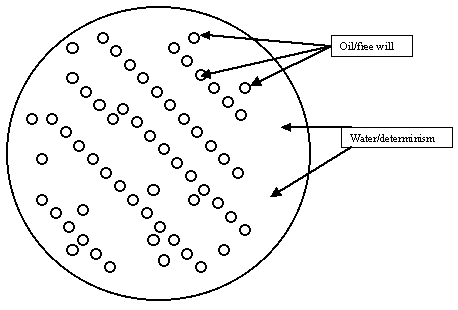
Possibility 2:
Oil/determinism
Water/free will
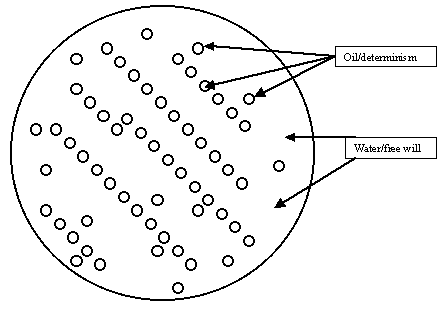
Possibility #1 suggests free will is found immersed ‘within determinism. Possibility # 2 suggests determinism is found immersed ‘within’ free will. Which is the ‘correct’ perspective?
Let’s examine the two possibilities and see where it gets us. As we do so, lets change the shape of the container for the purposes of making them more user friendly:
Possibility 1:
Oil/free will
Water/determinism
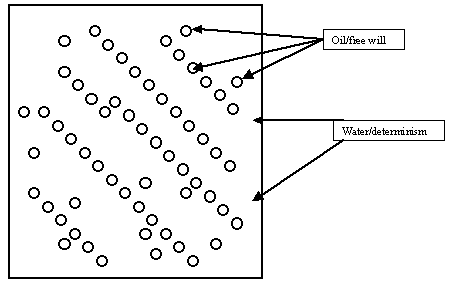
becomes:
Oil/free will
Water/determinism
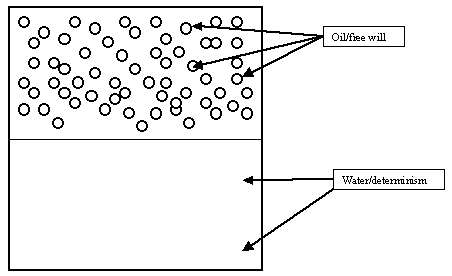
Possibility 2:
Oil/free will
Water/determinism
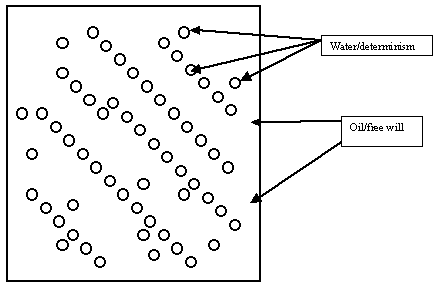
becomes:
Oil/free will
Water/determinism
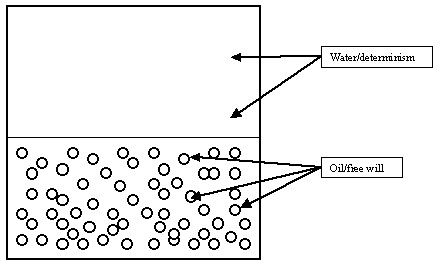
Now one will object to possibility #2 due to the general perception that oil is less dense than water. The objection evaporates, however, when one acknowledges that it is not oil and water we are examining but free will and determinism. Neither free will nor determinism can be measured in terms of density but the two are recognized as incompatible and thus the only rational we have been able to apply to our understanding regarding the existence of both existing simultaneously lies in Boethius’ argument that the two can coexist if we accept:
…’Therefore, all those things which happen without happening of necessity are, before they happen, future events about to happen, but not about to happen of necessity. For just as the knowledge of present things imposes no necessity on what is happening, so foreknowledge imposes no necessity on what is going to happen.
‘The cause of this mistake is that people think that the totality of their knowledge depends on the nature and capacity to be known of the objects of knowledge. But this is all wrong.’…
‘The point of greatest importance here is this: the superior manner of knowledge includes the inferior, but it is quite impossible for the inferior to rise to the superior.’…
‘In the same way, human reason refuses to believe that divine intelligence can see the future in any other way except that in which human reason has knowledge.’…
Boethius argues we must accept what we cannot possible understand as being what it is men say it is. Boethius argues we must accept our limits and stop trying to gain an understanding since we will never be able to understand. Boethius implies we have the ability to outline the problem but not the ability to understand the solution.
So it is we have remained mired in the lack of understanding.
Boethius states that free will finds itself subordinate to determinism, finds itself subordinate to divine foreknowledge yet remains free will and we must accept this in spite of the contradictory position such a statement forces us to assume.
In spite of the historic acceptance of such a position, the question remains: Is ‘free will’ free or is free will subordinate to determinism? The true existence of free will as opposed to the subordination of free will to determinism is what we must rationally examine and examine in detail.
The analogy of oil and water lies at the heart of the debate regarding: a) the independent – oil above water, b) the independent – an oil and water emulsion, or c) the interdependence - simultaneous existence of free will and determinism existing as a solution.
Why all the concern regarding the two simple concepts of free will and determinism? If our actions are ‘controlled’ by the forces of determinism, we, each one of us, is ‘controlled’. If our actions are ‘controlled’ by a ‘higher’ force - we are controlled. If our actions are controlled by ourselves – we are free. ‘Being’s’ puppets or ‘being free’ that is the issue.
This dialectic does not immerse itself only within past arguments, but rather this dialectic suggests a new solution to the debate. This dialectic suggests we reexamine the paradox from a new metaphysical perception. The new metaphysical perception is known:
Let’s begin to examine a new solution to this age old question regarding the simultaneous independent existence of free will and determinism by dividing action into four categories found ‘within’ this thing we call existence.
The four forms of action:
Four forms of action:
Passive action:
1. Action as a state of being:
The passive action of being is action in the form of the primal state of existence as opposed to other forms of action emerging from the primal state of existence
2. Actions bound by the laws of nature
Actions bound by the laws of nature are passive actions taken by inanimate objects as well as actions that simulate the action of inanimate objects – a rock falls, you fall, a rock exists, you exist
Active action:
3. Free will
Active actions of free will are actions taken by a ‘knowing’ object, action which could go various ways and whose action was directed by the ‘knowing’ object of it own accord.
4. Determinism
Active actions of free will taken by a ‘knowing’ object whose intended actions have been overridden by actions of free will generated by a dominating second ‘knowing’ object
This form of categorizing action provides the logic of accepting, as well as provides the means of understanding how determinism could exist ‘within’ a region of free will. This form of categorizing action provides an understanding how free will can fall under the influence of determinism through the action of determinism superceding free will. An example of just such a situation would be one forcefully holding the hand of another on a hot stove. The action of holding someone’s hand in the fire supercedes the desired action of the victim to remove their hand and thus the concept of ‘victim itself emerges.
Passive action:
1. The state of being: What ‘is’
The state of being is a form of action requiring no ‘knowing’. The state of being is:
a. The most basic form of action.
b. The most elementary form of all forms of action.
c. The primal state of existence.
All other forms of action emerge from this most basic form of action.
Examples of states of being: I exist. A rock exists.
2. Actions bound by the laws of nature: What ‘is being’
Actions bound by the laws of nature are action requiring no ‘knowing’. Since these actions require no ‘knowing’ they are classified as forms of passive actions. These are actions taken by inanimate objects. Such actions also include the actions of animate entities that simulate the action of inanimate objects.
Examples of actions bound by the laws of nature: When dropped from a cliff, a rock falls. When dropped from a cliff, you fall.
Active action:
3. Actions bound by the laws of free will: What ‘will be’
Actions bound by the laws of free will are ‘knowing’ actions taken by a ‘knowing’ entity and are independent of the laws of nature and independent of the laws of determinism. These actions are actions directed by the ‘knowing’ entity.
Examples of actions bound by the laws of free will are: I will step off the cliff.
4. Actions bound by the laws of determinism: What ‘has been’
Actions bound by the laws of determinism are active ‘knowing’ actions taken by a ‘knowing’ object and are independent of the laws of nature. These actions are actions taken by a ‘knowing’ entity whose intended actions have been over-ridden by actions of free will generated by a dominating second ‘knowing’ entity.
Examples of actions bound by the laws of determinism are: I am, against my will, pushed off the cliff by an entity itself bound by the laws of free will.
Having classified action in this manner, it is now possible to find a unique location for these four forms of action. The process of ‘finding’ a unique location for the four forms of action, provides us the means of examining the unique function of each action to the whole.
The unique location of:
- What ‘will be’: A location for ‘being’ – individuality
- What ‘is being’: A location for being – action, process/reality – the universe
- What ‘has been’: A location for ‘Being’ – the whole
- What ‘is’: A location for being – existence of existence
The order listed is different from the order originally listed. There is a reason for this. The order was intentionally reordered to emphasize the concept:
The individual value related to the four action forms have no relative greater significance or lesser significance to the metaphysical system within which they are found. The metaphysical system within which the four actions forms are found could not be ‘the’ unique metaphysical system it is if any of the four forms of action were to be eliminated. The value of each form of action is not a value of relativeness but rather the value of each of the four action forms have not only equal value for its own self but have equal value for each of the remaining three.
It must be emphasized repeatedly that the order is unimportant due to the lack of relative value existing within the system itself. What is important is the existence the four action forms. Without the existence of any of the four action forms, the system of ‘being’ being ‘Being’ becomes something it is not, which is a dynamic system.
What ‘will be’: Free will - A location for ‘being’ – individuality
A location for Free Will: The existence of ‘the potential to be’
A location of: What ‘will be’
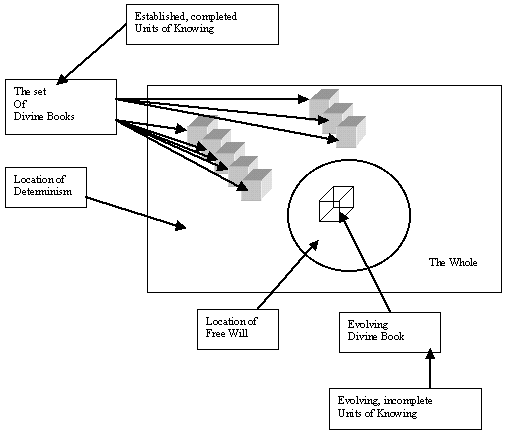
The ‘location’ of free will is a location where ‘knowing’ develops. The location of free will is itself a process. The location of free will, the ‘location’ of the process of what will be, provides the ‘location’ for the development of ‘becoming’. As such, under free will, ‘becoming’ develops itself as a unique point of knowledge. It may even be possible that this ‘location’, the ‘location’ for the action of pure free will, itself grows as the entities of knowing gain a more in depth understanding of the ‘location’ itself. In essence, the very growth of knowledge, the very growth of the ‘location’ where ‘becoming’ becomes, may influence further development of that very location.
Such a statement strongly implies: Complex abstractual perceptions developed through ‘knowing’ evolving ‘within’ a location where free will exists, may lend themselves to shifts of the location itself which in turn could conceivable alter the very perceptual potential of its very ‘occupants’. This could lead to an infinite number of qualitative and quantitative variations of evolution of the location of free will, thus expanding the ‘location of free will’s’ very ability to influence the development of new units of knowing.
As complex as this may all appear, the simple point remains: It becomes obvious why ‘location’ becomes a necessary component of a metaphysical system such as ‘symbiotic panentheism’. The whole has the characteristic of not only being but the whole is dependent upon the existence of free will to ‘produce’, evolve, establish unique units of knowing which expand the very knowing of the whole.
The reason determinism, as an aspect of the whole, is found ‘outside’ free will is because the knowledge, which has been established, the knowledge, which ‘is’, is. Each unit of knowing is a part of the whole. Each unit of ‘knowing’ can be ‘examined’ as infinite variations of partial units of itself, yet each unit of knowing can be ‘examined’ as a whole unit in and of itself found within the greater Whole.
Since there is a seemingly endless, infinite number of units of ‘knowing’, units of knowledge, units of perceptions gained through the process of acquiring knowledge while evolving within a location for free will, there emerges a sense of omniscience of the whole. In fact, there would be what one would call omniscience of the whole.
The question then becomes: Does free will exist as a part of the whole? Within a metaphysical system of ‘being’ being ‘Being’, free will does exist as a part of the whole for there is a location of free will located ‘within’, and therefore is a part of, the whole.
The question then becomes refined: Does free will exist as a part of the whole void the ‘locations’ of free will? In essence the question becomes: Does the whole as itself have free will?
Well now, this is a question, which goes to the understanding of the whole as the whole as opposed to the interrelationship of individual units of knowing and the whole. This is a question philosophy has never asked before because philosophy did not understand the concept of the whole having its own knowing separate from its knowing as the sum of individual packets of knowing which was thought to equal the whole. It was never considered how it was possible for the whole to be greater than the sum of its parts.
So again: Does the whole have free will other than that found within the physical universe within which knowing itself grows?
The question leads us back to the concept: Which came first, the chicken or the egg?
In terms of the whole: Could the whole have developed free will as a mechanism of growth or did the whole exist initially as the whole whose primal characteristics included the innate characteristic of free will? Alternatively, did the whole become the whole because it in fact used its preexisting free will to develop itself in the manner with which it does so?
This is not a typical question asked of metaphysics. Rather the question is a more theoretical problem requiring a theoretical solution. In essence, metaphysics, with the aid of these tractates, is becoming specialized into a field of theoretical metaphysics as opposed to the more practical metaphysics we find within our perception regarding reality of the physical universe, as we perceive it today. Again, another field of metaphysics arises, practical metaphysics. Once we begin to ask the more theoretical question we find ourselves being able to do so only ‘after’ we have accepted the more basic premises of metaphysics. The very acceptance of basic metaphysics premises produces what we call Practical Metaphysics. And with the establishment of practical metaphysics comes a natural out cropping, Metaphysical Engineering, the process of shaping society based upon what our most acceptable metaphysical system implies. The emergence of Metaphysical Engineering suggests Plato may have been more correct than he ever dreamed when he stated: It is the philosopher who should head government.
|
|
|














